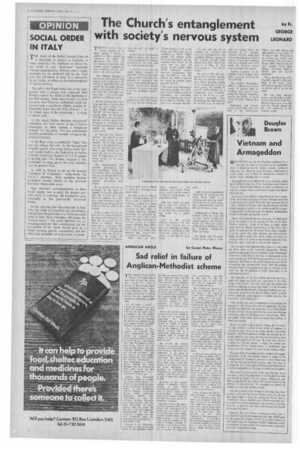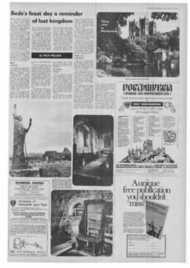Page 4, 12th May 1972
Page 4

Report an error
Noticed an error on this page?If you've noticed an error in this article please click here to report it.
Tags
Share
Related articles
Church Backs Cof E Union With Methodists
Methodists Face A Historic Decision
Plan For New Unity Talks Announced And Welcomed
Anglicans Who Want Catholic `features'
Anglican Consensus Fails To Make A Firm Decision On Unity
Sad relief in failure of Anglican-Methodist scheme
ANGLICAN ANGLE by Canon Peter Moore
rir HE General Synod of the Church of England failed last week to give the neces sary overall 75 `'. vote in favour of the current Anglican-Methodist unity scheme, which therefore fails, There is little doubt that it will be picked up and reassembled, somewhat differently, another time.
It's all rather a relief though, for the majority, a sad relief—of tensions that have built up over the years. And it is significant that the present percentage in favour was even less than on the last occasion the scheme was debated by the now extinct Church Assembly. Where do we go from here?
The Archbishop of Canterbury was certainly right when, immediately after the debate he asserted that ecumenical activities would not be halted by this, for already they were flourishing at grass root levels. Therein lies the hope for the future. The relationships between Anglicans and the other churches — and for some of us, most happily and significantly, that includes the Roman Communion have developed in a manner almost beyond the hopes (thought not the prayers) of those who recall the first tentative "approaches" over a quarter of a century ago.
Indeed, the ecumenical movement gained an impetus and urgency from the last war which was one of the few good things to come out of universal misery. It was Archbishop Fisher's famous Cambridge sermon which practically
challenged English nonconformists to take our overtures seriously. Prejudice has a long memory, and it has been miraculous to notice (always after the event, but then that is the only judgment recommended by the Old Testament prophets) how the frail ecumenical plant has burgeoned into a strong tree with hidden roots.
Historically, the Methodists are closest to Anglicanism and many of the principles which led them to separate have now been vindicated. Here was the most obvious area to begin. The proposals have foundered, not because Anglicans are insensitive either to the urgency of the situation in general or to the claims upon our conscience of the Methodists in particular, but fundamentally because a particular scheme has been overtaken, during its long gestation, by wider events outside the two Churches concerned.
During the last few years inter-communion has tended to be seen, not so much as an expression of identical theologies, but as a common turning to Christ in mutual trust and respect. It appears, not as the ultimate fruit of organic reunion, but as a permissible expression of a common faith. It would be unwise to press this general point too far.
But recently the General Synod has given permission for members of other traditions, in good standing with their own authorities. to be guests at Anglican altars. Thus has been regularised the practice of many of us for many years! But it does make a great difference. It provides, as it were, the basic (liturgical) opportunity for Anglicans and Methodists to grow and know together, rather than. by treaty, to seek to unite that which is divided.
Ignorance is the greatest strength of prejudice. And ignorance of each other's ecclesiastical traditions -and that, in today's terms, must mean worship — is the greatest single factor which divides us. We shall have less excuse for ignorance in future.
Secondly, there is the urgency, of the situation which is not always fully understood. It is disastrously easy, when it comes to giving rather than taking. to prefer another scheme which might emerge at some future time. Taize has taught me the need for boldness, perhaps for audacity in the name of Christian unity. It is probably true that a number of Anglicans
don't want change yet. And in this they are like St. Augustine. Let us pray that they. like St. Augustine, may be overtaken by grace.
But I think that there is a third reason behind this — and the figures at the synod in favour were bishops 85 per cent.; clergy 65.52 per cent.; and laity 62.82 per cent. There is a general debate throughout Christendom on the nature of authority in the Church; on ministry and episcopacy and priesthood. This discussion has developed during the years that the Anglican Methodist scheme has been debated, and I think the failure of that debate reflects in no small way Anglican .uncertainties.
It is easier to destroy than to build up. and the ecclesiastical demolition firms have been devilishly active recently. We have a recognisable Anglican inheritance, and there is reluctance (to use no other term) to • abandon this without a clearer vision of what will take its place.
A dignitary remarked to me, the day after the debate, that it looked as if Anglicans really had rejected episcopacy, as they had significantly rejected the positive (and rare) lead given by the bishops. I disagreed with him, and on reflection continue to do so. I think many loyal Anglicans believe episcopacy to be part of their inheritance. and were far from clear that this was being preserved by the cautious ambiguities of the proposed service of reconciliation.
I hope and pray that the prophets of doom — on both sides — will be proved wrong. Cooperation at parish level has gone too far to be stultified, and people have got to know each other and so respect each other (although often disagreeing at the same time). The formula of the Abbe Couturier is the possession of contemporary Christendom. Through the disappointment of the present situation we believe that we may be led to even greater things. Brethren, pray for us.
blog comments powered by Disqus











